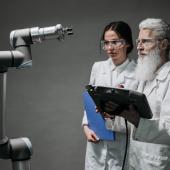The Little-Known Event that Made Einstein a Legendary Icon
On April 3rd, 1921, a handful of journalists went to interview a relatively unknown scientist named Albert Einstein. When they arrived to meet his ship they found a crowd of thousands waiting for him, screaming with adulation. Surprised at his popularity, and charmed by his genial personality, the story of Einstein's arrival made the front page in major papers.
It was all a bit of a mistake. The people in the crowd weren't there to see Einstein, but Chaim Weizmann, the popular Zionist leader that Einstein was traveling with. Nevertheless, that's how Einstein gained his iconic status. In a way, Einstein didn't get famous because of relativity, relativity got famous because of Einstein.
This, of course, in no way lessens Einstein's accomplishments, which were considerable. Yet as Albert Laszlo Barabasi, another highly accomplished scientist explains in The Formula, there is a great deal of difference between success and accomplishment. The truth is that success isn't what you think it is but, with talent, persistence and a some luck, anyone can achieve it.
There Is Virtually No Limit to Success, But There Is to Accomplishment
Einstein was, without a doubt, one of the great scientific minds in history. Yet the first half of the 20th century was a golden age for physics, with many great minds. Niels Bohr, Einstein's sparring partner at the famous Bohr-Einstein debates (which Bohr is widely considered to have won) was at least as prominent. Yet Einstein towers over all of them.
It's not just physicists, either. Why is it that Einstein has become a household name and not, say, Watson and Crick, who discovered the structure of DNA, an accomplishment at least as important as relativity? Even less known is Paul Erdos, the most prolific mathematician since Euler in the 18th century, who had an outrageous personality to boot?
For that matter, consider Richard Feynman, who is probably the second most famous physicist of the 20th century. He was, by all accounts, a man of great accomplishment and charisma. However, his fame is probably more due to his performance on TV following the Space Shuttle Challenger disaster than for his theory of quantum electrodynamics.
There are many great golfers, but only one Tiger Woods, just as there are many great basketball players, but only one Lebron James. The truth is that individual human accomplishment is bounded, but success isn't. Tiger Woods can't possibly hit every shot perfectly any more than Lebron James can score every point. But chances are, both will outshine all others in the public consciousness, which will drive their fame and fortune.
What's probably most interesting about Einstein's fame is that it grew substantially even as he ceased to be a productive scientist, long after he had become, as Robert Oppenheimer put it, "a landmark, not a beacon."
Success Relies on Networks
Let's try and deconstruct what happened after Einstein's arrival in the United States. The day after thousands came to greet Weizmann and the reporters mistakenly assumed that they were there for Einstein, he appeared on the front pages of major newspapers like The New York Times and the Washington Post. For many readers, it may have been the first time they had heard of any physicist.
As I noted above, this period was something of a heyday for physics, with the basic principles of quantum mechanics first becoming established, so it was a topic that was increasingly discussed. Few could understand the details, but many remembered the genius with the crazy white hair they saw in the newspaper. When the subject of physics came up, people would discuss Einstein, which spread his name further.
Barabási himself established this principle of preferential attachment in networks, also known as the "rich get richer" phenomenon or the Matthew effect. When a particular node gains more connections than its rivals, it tends to gain future connections at a faster rate. Even a slight change in early performance leads to a major advantage going forward.
In his book, Barabási details how this principle applies to things as diverse as petitions on Change.org, projects on Kickstarter and books on Amazon. It also applies to sites on the web, computers in a network and proteins in our bodies. Look at any connected system and you'll see preferential attachment at work.
Small Groups, Loosely Connected
The civil rights movement will always be associated with Martin Luther King Jr., but he was far from a solitary figure. In fact, he was just one of the Big Six of civil rights. Yet few today speak of the others. The only one besides King still relatively famous today is John Lewis and that's largely because of his present role as a US congressman.
Each of these men were not solitary figures either, but leaders of their own organizations, such as the NAACP, The National Urban League and CORE and these, in turn, had hundreds of local chapters. It was King's connection to all of these that made him the historic icon we know today, because it was all of those small groups, loosely connected, that made up the movement.
In my upcoming book, Cascades, I explain how many movements fail to bring change about by trying to emulate events like the March on Washington without first building small groups, loosely connected, but united by a shared purpose. It is those, far more than any charismatic personality or inspirational speech, that makes a movement powerful.
It also helps explain something about Einstein's iconic status. He was on the ship with Weizman not as a physicist, but as a Zionist activist and that dual status connected him to two separate networks of loosely connected small groups, which enhanced his status. So it is quite possible, if not probable, that we equate Einstein with genius today and not, say, Bohr, because of his political activity as much as for his scientific talent.
Randomness Rewards Persistence
None of this should be taken to mean that Einstein could have become a legendary genius if he hadn't made truly landmark discoveries. It was the combination of his prominence in the scientific community with the happy accident of Weizmann's adoring crowds being mistaken for his own, that made him a historic figure.
Still, we can imagine an alternate universe in which Einstein becomes just as famous. He was, for example, enormously quotable and very politically active. (He was, at one time, offered the presidency in Israel). So it is completely possible that some other event, combined with his very real accomplishments, would have catapulted him to fame. There is always an element of luck and randomness in every success.
Yet Einstein's story tells us some very important things about what makes a great success. It is not, as many tell us, simply a matter of working hard to achieve something because human performance is, as noted above, bounded. You can be better than others, but not that much better. At the same time, it takes more than just luck. It is a combination of both and we can do much to increase our chances of benefiting from them.
Einstein was incredibly persistent, working for ten years on special relativity and another ten for general relativity. He was also a great connector, always working to collaborate with other scientists as well as political figures like Weizmann and even little girls needing help with their math homework. That's what allowed him to benefit from loosely connected small groups.
Perhaps most importantly, these principles of persistence and connection are ones that any of us can apply. We might not all be Einsteins, but with a little luck, we just might make it someday.






